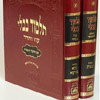More Than a Quick Question: The Correct Way to Inquire
הרב שי טחןיח סיוון, תשפה14/06/2025Asking a question is not just about getting an answer—it’s part of a shared process that requires thought and clarity
תגיות:שאלות לרבאמונהלימוד
צילום: נוצרה על ידי בינה מלאכותית
"Ask in the Proper Manner" (Avot 5:7)
While rabbis are glad to share their halachic knowledge and guidance, the responsibility doesn’t lie with them alone. Asking a question is not just about getting an answer—it’s part of a shared process that requires thought and clarity. As the saying goes, “A well-asked question is half the answer.” Halacha addresses not only what to ask, but also how, when, and whom to ask. Following these guidelines ensures that the process of seeking Torah guidance is respectful, efficient, and effective.
/>While rabbis are glad to share their halachic knowledge and guidance, the responsibility doesn’t lie with them alone. Asking a question is not just about getting an answer—it’s part of a shared process that requires thought and clarity. As the saying goes, “A well-asked question is half the answer.” Halacha addresses not only what to ask, but also how, when, and whom to ask. Following these guidelines ensures that the process of seeking Torah guidance is respectful, efficient, and effective.

צילום: נוצרה על ידי בינה מלאכותית
How to Ask?
When posing a halachic question, clarity is essential. Though this may seem obvious, it bears emphasizing. All too often, a rabbi receives vague questions like:
“Shalom, Rabbi, is it okay for me to listen to music?”
Now we surely don’t expect for the rabbi to treat this like a Talmudic sugya, considering all possible scenarios. Is the question asked because the person in mourning (aveilut)? Is it during Sefirat HaOmer or the Three Weeks? Is he asking about leaving music playing on Shabbat from before sunset? Or perhaps he wonders if listening to music is permitted at all, as some opinions forbid. Each of these possibilities could yield a different answer. Therefore, the question must be clear.
Of course, once a rabbi receives an unclear question, he is obligated to ask for the necessary details. However, we must recognize that a rabbi's time is valuable, and we should do our part to minimize unnecessary back-and-forth by presenting our questions as clearly and precisely as possible from the outset.
At the same time, the question should be concise and to the point, not too long and without unnecessary details. Rabbanim are often extremely busy—especially those who devote much of their day to learning—and do not have the time or patience for lengthy, unrelated back stories.
If you have a lengthy concern, you should first ask the rabbi if he has time to discuss it—and if not, when would be a good time. Don’t launch into a long story without checking; it can be inconsiderate and burdensome.
Sometimes people ask overly broad questions like, “When is a loan considered interest (ribbit)?” While the question may stem from a specific situation, it is unfair to expect the rabbi to teach all the laws of ribbit or try to guess what the real question is. The questioner should think through what they truly want to ask and formulate it clearly.
This applies especially to questions sent via text. Typos, autocorrect errors, or vague wording can completely alter the meaning. Often the sender doesn’t even review what they typed. Were the same person sending a message to a lawyer—who charges by the minute—they would surely reread it multiple times to avoid waste. Why should a rabbi, who graciously serves the public, deserve less consideration?
When to Ask?
For some reason, there are people who believe that a rabbi can be contacted 24/7. They feel no hesitation in calling during the middle of the night. If the question involved pikuach nefesh, we would understand. But in reality, questions asked during those hours are rarely urgent. It’s as if the caller assumes the rabbi has nothing else to do and they’re doing him a favor by giving him something to occupy his time.
Some treat their rabbi like a smartphone app—ready on demand on speed dial whenever they have a question. There are even those who call daily, as if they have an unlimited subscription. While it's praiseworthy to consult a rabbi when in doubt, one must also remember that beyond the phone line is a human being, with a schedule, obligations, and a life of his own. His time is not solely designated for whoever happens to call first.
What to ask?
What to ask is another important point. If you have a personal or family matter—such as a shalom bayit issue or a concern with a child—your conversation will likely be time-consuming. Make sure the rabbi has the time for it. Just as importantly, make sure he’s someone who deals with these types of issues. Many times, people bring questions to rabbis who aren't experienced in that area, when they would be better served by speaking to a rabbi who is, or even a qualified professional.
Hey Rabbi
Addressing the rabbi is another important consideration. While the rabbi himself may not be particular about how he is addressed, we must do our part to show proper respect. One should not send a message that reads, “Hey rabbi, what’s up? You’re up for a quick question?” Such casual language reflects a lack of kavod haTorah (honor for Torah) and diminishes the seriousness of the interaction. When seeking guidance in Torah matters, our approach should reflect the reverence due to both the Torah and its teachers.
It’s worth noting that questions that begin with the phrase “Can I ask a quick question?” are, for some strange reason, usually anything but quick.
With all due respect
And of course, there are those who begin questioning a rabbi with an introduction like, “Rabbi, with all due respect.” For some reason, this opening makes the person feel as though it now gives them license to start arguing forcefully. If you feel the rabbi may have made a mistake, you can address it respectfully—perhaps by saying something like, “If the rabbi doesn’t mind, I’d like to ask from…” This form of respectful challenge is actually the proper approach outlined by the Gemara. As the Rambam writes, if a student sees his rabbi violating the Torah, he should not rebuke him directly but rather say with great respect: “My teacher, didn’t you teach us that one should do…?”
Now, of course, a rabbi can be wrong—he’s human. But if he didn’t make an obvious mistake, and simply gave a ruling you don’t agree with, you should still respect the psak. After all, you approached him with a question, which means you sought his guidance and valued his opinion. It’s certainly appropriate to ask for clarification—if the rabbi has the time. But don’t assume he’s now available to deliver a full shiur with all the background and sources behind his ruling. Show respect for his time and for the Torah he represents.
Whom to Ask
In the past, we mentioned the words of the Tzemach Tzedek (cited in Pithei Teshuvah, Yoreh De’ah 99), who explains that one who asks a lamdan—a learned individual who is not a recognized posek—and follows his ruling, but the ruling is incorrect, is considered a mezid (intentional transgressor) rather than a shogeg (unintentional), because he relied on someone not qualified to rule. However, if he consulted a recognized posek and the ruling turned out to be mistaken, he is judged as a shogeg, since he did what was expected.
The Meshech Chochmah (beginning of Parashat Bo) discusses how one becomes known and established as a moreh hora’ah (halachic authority):
“It is well known that honor among the people comes in two forms: either from the individual's exceptional wisdom, godly character, and upright conduct—or from unusual and wondrous acts that appear supernatural. The former earns respect first from the sages of the generation, who recognize true wisdom, scrutinize conduct, and examine character with discernment. Once they revere him, his name spreads to the masses, who in turn respond with awe. But someone admired only for his wonders gains fame first among the masses, who lack discernment and quickly declare him otherworldly. As stories spread—often exaggerated or fabricated—his fame increases until even the discerning are tempted to question whether so much admiration is undeserved. Experience proves this pattern time and again
In short, there is a proper way to ask, a proper time to ask, and a proper person to ask. Observing these guidelines not only honors the rabbi but also upholds the dignity and integrity of halachic inquiry itself.
הוסף תגובה
עוד מהרב שי טחן
עוד בנושא מחשבה








